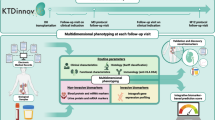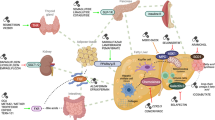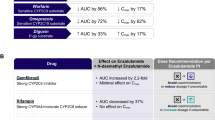Abstract
Introduction
The immunosuppressive therapy with everolimus (ERL) after heart transplantation is characterized by a narrow therapeutic window and a substantial variability in dose requirement. Factors explaining this variability are largely unknown.
Objectives
Our aim was to evaluate factors affecting ERL metabolism and to identify novel metabolites associated with the individual ERL dose requirement to elucidate mechanisms underlying ERL dose response variability.
Method
We used liquid chromatography coupled with mass spectrometry for quantification of ERL metabolites in 41 heart transplant patients and evaluated the effect of clinical and genetic factors on ERL pharmacokinetics. Non-targeted plasma metabolic profiling by ultra-performance liquid chromatography and high resolution quadrupole-time-of-flight mass spectrometry was used to identify novel metabolites associated with ERL dose requirement.
Results
The determination of ERL metabolites revealed differences in metabolite patterns that were independent from clinical or genetic factors. Whereas higher ERL dose requirement was associated with co-administration of sodium-mycophenolic acid and the CYP3A5 expressor genotype, lower dose was required for patients receiving vitamin K antagonists. Global metabolic profiling revealed several novel metabolites associated with ERL dose requirement. One of them was identified as lysophosphatidylcholine (lysoPC) (16:0/0:0). Subsequent targeted analysis revealed that high levels of several lysoPCs were significantly associated with higher ERL dose requirement.
Conclusion
For the first time, this study describes distinct ERL metabolite patterns in heart transplant patients and detected potentially new drug–drug interactions. The global metabolic profiling facilitated the discovery of novel metabolites associated with ERL dose requirement that might represent new clinically valuable biomarkers to guide ERL therapy.




Similar content being viewed by others
References
Andreassen, A. K., Andersson, B., Gustafsson, F., Eiskjaer, H., Radegran, G., Gude, E., et al. (2014). Everolimus initiation and early calcineurin inhibitor withdrawal in heart transplant recipients: a randomized trial. American Journal of Transplant, 14(8), 1828–1838. https://doi.org/10.1111/ajt.12809.
Azimzadeh, A. M., Lees, J. R., Ding, Y., & Bromberg, J. S. (2011). Immunobiology of transplantation: impact on targets for large and small molecules. Clinical Pharmacology & Therapeutics, 90(2), 229–242. https://doi.org/10.1038/clpt.2011.106.
Boernsen, K. O., Egge-Jacobsen, W., Inverardi, B., Strom, T., Streit, F., Schiebel, H. M., et al. (2007). Assessment and validation of the MS/MS fragmentation patterns of the macrolide immunosuppressant everolimus. Journal of Mass Spectrometry, 42(6), 793–802. https://doi.org/10.1002/jms.1215.
Burnham, K. P., & Anderson, D. R. (2002). Model selection and multimodel inference (1st edn.). New York: Springer.
Chapman, T. M., & Perry, C. M. (2004). Everolimus. Drugs, 64(8), 861–872 (discussion 873–864).
Eisen, H. J., Tuzcu, E. M., Dorent, R., Kobashigawa, J., Mancini, D., Valantine-von Kaeppler, H. A., et al. (2003). Everolimus for the prevention of allograft rejection and vasculopathy in cardiac-transplant recipients. New England Journal of Medicine, 349(9), 847–858. https://doi.org/10.1056/NEJMoa022171.
Everett, J. R. (2016). From metabonomics to pharmacometabonomics: The role of metabolic profiling in personalized medicine. Frontiers in Pharmacology. https://doi.org/10.3389/fphar.2016.00297.
Excoffier, L., & Lischer, H. E. (2010). Arlequin suite ver 3.5: A new series of programs to perform population genetics analyses under Linux and Windows. Molecular Ecology Resources, 10(3), 564–567. https://doi.org/10.1111/j.1755-0998.2010.02847.x.
Fahy, E., Sud, M., Cotter, D., & Subramaniam, S. (2007). LIPID MAPS online tools for lipid research. Nucleic Acids Research, 35, W606–W612. https://doi.org/10.1093/nar/gkm324.
Fang, Z. Z., & Gonzalez, F. J. (2014). LC-MS-based metabolomics: An update. Archives of Toxicology, 88(8), 1491–1502. https://doi.org/10.1007/s00204-014-1234-6.
Furger, P., & Suter, T. M. (2009). SURFmed: Guidelines internal medicine (2nd ed.). Neuhausen: Editions D&F GmbH.
Hernandez-Ruedas, M. A., Arroyo-Rodriguez, V., Meave, J. A., Martinez-Ramos, M., Ibarra-Manriquez, G., Martinez, E., et al. (2014). Conserving tropical tree diversity and forest structure: the value of small rainforest patches in moderately-managed landscapes. PLoS ONE, 9(6), e98931, https://doi.org/10.1371/journal.pone.0098931.
Hiemann, N. E., Wellnhofer, E., Lehmkuhl, H. B., Knosalla, C., Hetzer, R., & Meyer, R. (2011). Everolimus prevents endomyocardial remodeling after heart transplantation. Transplantation, 92(10), 1165–1172. https://doi.org/10.1097/TP.0b013e3182332886.
Hollis, I. B., Reed, B. N., & Moranville, M. P. (2015). Medication management of cardiac allograft vasculopathy after heart transplantation. Pharmacotherapy, 35(5), 489–501. doi:https://doi.org/10.1002/phar.1580.
Jasiak, N. M., & Park, J. M. (2016). Immunosuppression in solid-organ transplantation: Essentials and practical tips. Critical Care Nursing Quarterly, 39(3), 227–240. https://doi.org/10.1097/CNQ.0000000000000117.
Ji, Y., Hebbring, S., Zhu, H., Jenkins, G. D., Biernacka, J., Snyder, K., et al. (2011). Glycine and a glycine dehydrogenase (GLDC) SNP as citalopram/escitalopram response biomarkers in depression: Pharmacometabolomics-informed pharmacogenomics. Clinical Pharmacology & Therapeutics, 89(1), 97–104. https://doi.org/10.1038/clpt.2010.250.
Kaddurah-Daouk, R., & Weinshilboum, R. & Pharmacometabolomics-Research-Network (2015). Metabolomic signatures for drug response phenotypes: Pharmacometabolomics enables precision medicine. Clinical Pharmacology & Therapeutics, 98(1), 71–75, https://doi.org/10.1002/cpt.134.
Kessey, A., Lewin, A., & Strimmer, K. (2015). Optimal whitening and decorrelation. arXiv:1512.00809v1.
Kirchner, G. I., Meier-Wiedenbach, I., & Manns, M. P. (2004). Clinical pharmacokinetics of everolimus. Clinical Pharmacokinetics, 43(2), 83–95. https://doi.org/10.2165/00003088-200443020-00002.
Kovarik, J. M., Eisen, H., Dorent, R., Mancini, D., Vigano, M., Rouilly, M., et al. (2003). Everolimus in de novo cardiac transplantation: Pharmacokinetics, therapeutic range, and influence on cyclosporine exposure. The Journal of Heart and Lung Transplantation, 22(10), 1117–1125.
Lavi, S., McConnell, J. P., Rihal, C. S., Prasad, A., Mathew, V., Lerman, L. O., et al. (2007). Local production of lipoprotein-associated phospholipase A2 and lysophosphatidylcholine in the coronary circulation: association with early coronary atherosclerosis and endothelial dysfunction in humans. Circulation, 115(21), 2715–2721. https://doi.org/10.1161/CIRCULATIONAHA.106.671420.
Lemaitre, F., Bezian, E., Goldwirt, L., Fernandez, C., Farinotti, R., Varnous, S., et al. (2012). Population pharmacokinetics of everolimus in cardiac recipients: comedications, ABCB1, and CYP3A5 polymorphisms. Therapeutic Drug Monitoring, 34(6), 686–694. https://doi.org/10.1097/FTD.0b013e318273c899.
Lesche, D., Sigurdardottir, V., Setoud, R., Englberger, L., Fiedler, G. M., Largiader, C. R., et al. (2015). Influence of CYP3A5 genetic variation on everolimus maintenance dosing after cardiac transplantation. Cliniacl Transplantation, 29(12), 1213–1220. https://doi.org/10.1111/ctr.12653.
Levey, A. S., Stevens, L. A., Schmid, C. H., Zhang, Y. L., Castro, A. F., Feldman, H. I., et al. (2009). A new equation to estimate glomerular filtration rate. Annals of Internal Medicine, 150(9), 604–612.
Matsumoto, T., Kobayashi, T., & Kamata, K. (2007). Role of lysophosphatidylcholine (LPC) in atherosclerosis. Current Medicinal Chemistry, 14(30), 3209–3220.
Moes, D. J., Swen, J. J., den Hartigh, J., van der Straaten, T., van der Heide, J. J., Sanders, J. S., et al. (2014). Effect of CYP3A4*22, CYP3A5*3, and CYP3A combined genotypes on cyclosporine, everolimus, and tacrolimus pharmacokinetics in renal transplantation. CPT Pharmacometrics & Systems Pharmacology, 3, e100. https://doi.org/10.1038/psp.2013.78.
Otagiri, M., Fleitman, J. S., & Perrin, J. H. (1980). Investigations into the binding of phenprocoumon to albumin using fluorescence spectroscopy. Journal of Pharmacy and Pharmacology, 32(7), 478–482.
Patti, G. J., Yanes, O., & Siuzdak, G. (2012). Innovation: Metabolomics: The apogee of the omics trilogy. Nature Reviews Molecular Cell Biology, 13(4), 263–269. https://doi.org/10.1038/nrm3314.
Raichlin, E., & Kushwaha, S. S. (2008). Proliferation signal inhibitors and cardiac allograft vasculopathy. Current Opinion in Organ Transplantation, 13(5), 543–550. https://doi.org/10.1097/MOT.0b013e32830fdf70.
Ramautar, R., Berger, R., van der Greef, J., & Hankemeier, T. (2013). Human metabolomics: Strategies to understand biology. Current Opinion in Chemical Biology, 17(5), 841–846. https://doi.org/10.1016/j.cbpa.2013.06.015.
Rosing, K., Fobker, M., Kannenberg, F., Gunia, S., Dell’Aquila, A. M., Kwiecien, R., et al. (2013). Everolimus therapy is associated with reduced lipoprotein-associated phospholipase A2 (Lp-Pla2) activity and oxidative stress in heart transplant recipients. Atherosclerosis, 230(1), 164–170. https://doi.org/10.1016/j.atherosclerosis.2013.07.007.
Schmitz, G., & Ruebsaamen, K. (2010). Metabolism and atherogenic disease association of lysophosphatidylcholine. Atherosclerosis, 208(1), 10–18. https://doi.org/10.1016/j.atherosclerosis.2009.05.029.
Schniedewind, B., Niederlechner, S., Galinkin, J. L., Johnson-Davis, K. L., Christians, U., & Meyer, E. J. (2015). Long-term cross-validation of everolimus therapeutic drug monitoring assays: the Zortracker study. Therapeutic Drug Monitoring, 37(3), 296–303. https://doi.org/10.1097/FTD.0000000000000191.
Schoeppler, K. E., Aquilante, C. L., Kiser, T. H., Fish, D. N., & Zamora, M. R. (2014). The impact of genetic polymorphisms, diltiazem, and demographic variables on everolimus trough concentrations in lung transplant recipients. Clinical Transplantation, 28(5), 590–597. https://doi.org/10.1111/ctr.12350.
Schweiger, M., Stiegler, P., Puntschart, A., Sereinigg, M., Prenner, G., Wasler, A., et al. (2012). Everolimus in different combinations as maintenance immunosuppressive therapy in heart transplant recipients. Experimental and Clinical Transplantation, 10(3), 273–277.
Serna, J., Garcia-Seisdedos, D., Alcazar, A., Lasuncion, M. A., Busto, R., & Pastor, O. (2015). Quantitative lipidomic analysis of plasma and plasma lipoproteins using MALDI-TOF mass spectrometry. Chemistry and Physics of Lipids, 189, 7–18. https://doi.org/10.1016/j.chemphyslip.2015.05.005.
Smith, C. A., O’Maille, G., Want, E. J., Qin, C., Trauger, S. A., Brandon, T. R., et al. (2005). METLIN: A metabolite mass spectral database. Therapeutic Drug Monitoring, 27(6), 747–751.
Strom, T., Haschke, M., Boyd, J., Roberts, M., Arabshahi, L., Marbach, P., et al. (2007a). Crossreactivity of isolated everolimus metabolites with the Innofluor Certican immunoassay for therapeutic drug monitoring of everolimus. Therapeutic Drug Monitoring, 29(6), 743–749. https://doi.org/10.1097/FTD.0b013e31815b3cbf.
Strom, T., Haschke, M., Zhang, Y. L., Bendrick-Peart, J., Boyd, J., Roberts, M., et al. (2007b). Identification of everolimus metabolite patterns in trough blood samples of kidney transplant patients. Therapeutic Drug Monitoring, 29(5), 592–599. https://doi.org/10.1097/FTD.0b013e3181570830.
Sumner, L. W., Amberg, A., Barrett, D., Beale, M. H., Beger, R., Daykin, C. A., et al. (2007). Proposed minimum reporting standards for chemical analysis. Metabolomics, 3(3), 211–221. https://doi.org/10.1007/s11306-007-0082-2.
Tellis, C. C., & Tselepis, A. D. (2009). The role of lipoprotein-associated phospholipase A2 in atherosclerosis may depend on its lipoprotein carrier in plasma. Biochim Biophys Acta, 1791(5), 327–338. https://doi.org/10.1016/j.bbalip.2009.02.015.
Ufer, M., Svensson, J. O., Krausz, K. W., Gelboin, H. V., Rane, A., & Tybring, G. (2004). Identification of cytochromes P450 2C9 and 3A4 as the major catalysts of phenprocoumon hydroxylation in vitro. European Journal of Clinical Pharmacology, 60(3), 173–182. https://doi.org/10.1007/s00228-004-0740-5.
Wessler, J. D., Grip, L. T., Mendell, J., & Giugliano, R. P. (2013). The P-glycoprotein transport system and cardiovascular drugs. Journal of the American College of Cardiology, 61(25), 2495–2502. https://doi.org/10.1016/j.jacc.2013.02.058.
Wishart, D. S., Jewison, T., Guo, A. C., Wilson, M., Knox, C., Liu, Y., et al. (2013). HMDB 3.0–The human metabolome database in 2013. Nucleic Acids Research, 41, D801–D807. https://doi.org/10.1093/nar/gks1065.
Wolf, S., Schmidt, S., Muller-Hannemann, M., & Neumann, S. (2010). In silico fragmentation for computer assisted identification of metabolite mass spectra. BMC Bioinformatics, 11, 148. https://doi.org/10.1186/1471-2105-11-148.
Acknowledgements
We thank Barbara Rindlisbacher and Roland Geyer form the Clinical Metabolomics Facility at the Centre of Laboratory Medicine (Bern University Hospital) and Bjoern Schniedewind from the iC42 Clinical Research and Development Facility in Denver for technical support, as well as the personnel of the heart failure outpatient clinic at the Bern University Hospital for assistance in patient recruitment.
Funding
The study was funded by grants from the Foundation for Pathobiochemistry and Molecular Diagnostics of the German Society of Clinical Chemistry and Laboratory Medicine to J.S., from the United States National Institutes of Health (NICHD R01 HD070511) to U.C., and from the Katharina Huber-Steiner foundation to P.M.
Author information
Authors and Affiliations
Corresponding author
Ethics declarations
Conflict of interest
All authors declare that they have no conflict of interest directly or indirectly related to the research presented in this manuscript.
Additional information
Dorothea Lesche and Vilborg Sigurdardottir are co-primary authors.
Electronic supplementary material
Below is the link to the electronic supplementary material.
Rights and permissions
About this article
Cite this article
Lesche, D., Sigurdardottir, V., Leichtle, A.B. et al. Targeted and global pharmacometabolomics in everolimus-based immunosuppression: association of co-medication and lysophosphatidylcholines with dose requirement. Metabolomics 14, 3 (2018). https://doi.org/10.1007/s11306-017-1294-8
Received:
Accepted:
Published:
DOI: https://doi.org/10.1007/s11306-017-1294-8




